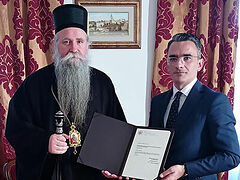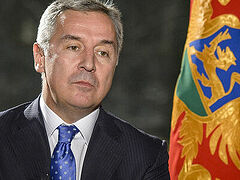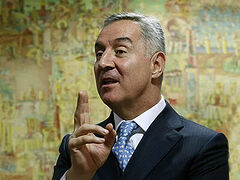Podgorica, Montenegro, March 12, 2021
Still licking his wounds after failing to seize Serbian Orthodox Church property, Montenegrin President Milo Đukanović is now threatening to expel Orthodox priests from the country.
In response to a priest of the Serbian Orthodox Church who recently stated that there are more clergymen than soldiers in Montenegro, the President spoke of the need to “resolve this discrepancy” and threatened to deport a number of priests, claiming they are there illegally, reports Politika.
“If someone thinks he can send us messages that there are more priests of the Serbian Orthodox Church than soldiers in Montenegro, he only warns us that we have to settle this discrepancy, and we will probably settle it naturally so there will be no place in Montenegro for those who are staying here illegally,” the President said.
Archpriest Velibor Džomić earlier said that there are 650 church councils in the Serbian Church in Montenegro. “If every council has at least five people, that’s already more than 3,000 people. That’s more than the entire Montenegrin army,” he said.
The President also made veiled threats against the new government, which overturned his infamous anti-Orthodox law, saying he records the actions of all those “who use power to destroy the Montenegrin identity.”
This is not the first time that Đukanović, who supports the numerically insignificant, hyper-nationalistic “Montenegrin Orthodox Church, which is unrecognized by the Orthodox world, has taken aim against representatives of the Serbian Church. In December 2018, OrthoChristian reported that he was refusing to extend the residency permits of more than 50 monastics and clergymen of the Serbian Church.
A year later, the so-called “Law on Religious Freedom” was adopted when Đukanović’s party still held majority power in Parliament, essentially affording the state the authority to seize 650 properties from the Serbian Orthodox Church and claim them for its own.
The Orthodox faithful gathered in massive peaceful protests throughout the nation for months, declaring their intention to protect their holy sites. During this time, hierarchs and priests were routinely arrested and interrogated.
The President then lost his majority in the August elections. The new government came into power on December 4 and immediately set about correcting the government’s stance towards the Orthodox Church.
Although the Parliament adopted necessary amendments to the law on December 29, ending the persecution of the Serbian Church and making all religious bodies equal in the eyes of the law, President Đukanović exercised his veto power and returned the law to Parliament for a second vote. The law was then adopted a second time in January and signed by the President later that month.
Follow us on Facebook, Twitter, Vkontakte, Telegram, WhatsApp, Parler, MeWe, and Gab!





